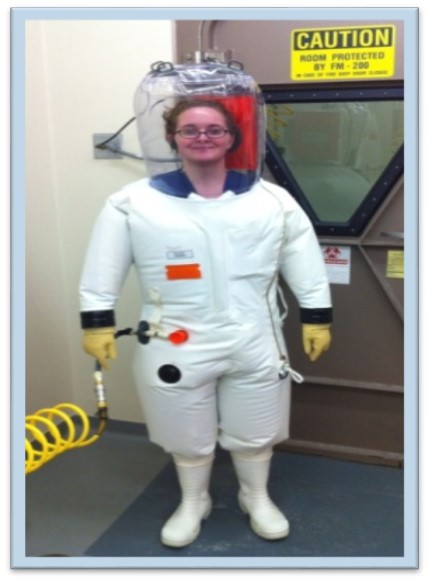Congrats Kendra Alfson: Newest Graduate of the Microbiology and Immunology program!
Congratulations Kendra Alfson, the newest graduate from the Microbiology and Immunology program, for successfully defending your dissertation “characterizing and understanding the biological consequences of filovirus genome plasticity.”
Please tell me about yourself, why did you pick UT Health Science Center, and your program.

I was born and raised in Denver, Colorado, which is where I received my B.S. in Biology (at University of Colorado Denver)—I
still miss the mountains often, but I never liked skiing.
I worked through high school and college at a movie theater. Then I became a research assistant for a social science nonprofit group. That job helped me realize I enjoyed research but I knew I could only be truly passionate about something in the “hard”
sciences, ideally something microbiology related.
I thought I might want to teach one day at the college level, which is one reason I chose to pursue graduate education. I chose UTHSCSA for many reasons; I liked the idea of an
interdisciplinary program, San Antonio seemed like a great place to live, the research being done at the school (and at Texas Biomedical Research Institute under the lab of Dr. Anthony Griffiths where chose to
do my research) was fascinating.
Because I was always intrigued by microbiology and specifically virology, the program was a no brainer. I also liked the multidisciplinary nature of the program; I thought it would help me become more well-rounded and prepared for the increasingly interdisciplinary world of science research.
I chose to do my research at Texas Biomedical Research Institute because I loved the environment and amazing research there. Everyone was very helpful, supportive, knowledgeable, friendly, and enthusiastic during my rotations. I felt like it would be a great place to learn, grow, and become
part of the “family.”
Please provide a few sentences summarizing your dissertation. What was the experience like for you?
I investigated the hypothesis that filoviruses have high spontaneous mutation rates that contribute to viral evolution, viral diversity, and pathogenicity.
This is an important question because the genome plasticity of filoviruses—highly lethal, incurable, hemorrhagic fever viruses—was unknown and information about this is critical for gaining a better understanding or viral emergence, viral transmission, pathogenesis, and for developing treatments or preventative measures.
My results supported the hypothesis and indicated that the mutation frequency for filoviruses is similar to other RNA viruses. Furthermore, I found that filovirus genome plasticity generated genotypic and phenotypic changes when the virus was subjected to different selection pressures and filovirus genome plasticity has important consequences during in vivo studies of countermeasure development or disease modeling.
The experience was really great. I truly enjoyed my lab, supervisor, and the environment at Texas
Biomedical Research Institute. I was so lucky to have such an exciting, dynamic project to work on.
The project continued to expand in to a lot of cool areas so I always had new and intriguing directions to go in. It was an incredible journey; I met many amazing people along the way and learned so much.
Why are you passionate about your research topic? How did you first become interested in it?
I have always been interested in filoviruses but never dreamed I would be lucky enough to gain the opportunity to do research on them.
My mom was a nurse and inspired me at a young age to learn more about science and public health issues. I first became interested in filoviruses years ago from reading about them (in books like aHot Zone’); I think this is a very cliche response but it’s definitely the case for me.
Since high school, I’ve also been fascinated by genetics and evolution. So a project that combined these two topics (viruses and genetics/evolution) was perfect for me.
What was your best memory during graduate school or what did you learn?
I learned that a positive attitude and outlook can go a long way in helping survive and succeed in graduate school. I worked in a smaller lab environment where team work was super important so I learned how important and helpful a good, trustworthy, group of colleagues (that you get along with) can be.
Some of my best memories from graduate school were attending the ASM Biodefense and Emerging Diseases Research Meeting in Washington, D.C. I’ve been fortunate enough to attend four years now. It has been a great opportunity to learn a lot about new advances in the field, bond with colleagues, network, and grow as a scientist.
What’s next?
I have accepted a postdoctoral scientist position at Texas Biomedical Research Institute. I’ll be pursuing some new avenues opened up by my dissertation project, become more involved in some in vivo projects, and start on some new projects/experiments the lab is taking on. I’m very excited and looking forward to my future there.
Any advice for your fellow graduate students?
Stay positive; there is a light at the end of the tunnel and when you get there you realize how completely worth it everything was (even if it didn’t always feel like that at the time!). You will make it through if you keep a good attitude, apply yourself, and work hard.
Create and nurture good, close relationships with your fellow graduate students and colleagues—they are the support that will help get you through the tough times.
While it is important to work hard (and often work a lot of hours), don’t neglect your personal life; your work will suffer if you don’t take time to relax/blow off steam and you need to live in the now (enjoy your current situation!) rather than constantly living for tomorrow.
